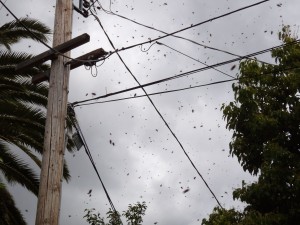City living irritates me. There are so many rules, regulations, and restrictions in the name of ‘safety’ and ‘health’. I tend to think a lot of the limitations have much more to do with preserving some notion of civility and with a cultural effort to keep our lives distanced from what nourishes and sustains us.
Why can’t we have a rooster, for instance? Or goats? Why can’t we sell the food we grow at a little stand out by the road, or walk the ten minutes to the local farmers market (where you can buy produce grown several hundred miles away) and sell it there?
Sure, roosters are noisy—as we discovered when we accidentally raised two of them—but so is the neighbor’s incessantly barking dog, and so are the numerous celebrations at the rental party hall down the block (yes, really).
Maybe I should stop complaining and just be grateful there’s no HOA to report to in our neighborhood, no law against front yard food, and that we can indeed keep a few chickens legally. We can keep bees legally here too, in theory, and in practice no one has complained.
The reality is that city rules around food production and animal husbandry vary radically between communities. Several of the larger cities around us (San Francisco, Oakland, and Berkeley) do allow goats, as do multiple other cities around the US. San Francisco allows roosters, too, but they’re in the minority on that one. Seattle, WA allows urban farmers to sell their produce.
Other towns around us categorically prohibit bees or chickens, or create restrictions that make it logistically impossible for most residents. For example, in our town of mostly small suburban lots, one can keep two goats for every one-acre parcel of land. In other local towns, beehives must be kept a minimum of 200 yards from any dwelling, including that of the beekeeper.
Aside from serving a party-pooper capacity—Really? I can’t pursue every theoretically possible edible adventure in my backyard?!!!—limitations on urban gardeners and farmers restrict the degree to which we can create self-sufficient food systems in cities. If there’s no rooster, there aren’t going to be any chicks, and every new round of birds will require a trip to the feed store or an arrangement with more rural chicken-breeding friends. Likewise, I haven’t heard of any US cities that allow the keeping of unneutered male goats.
In cities where beekeeping is allowed, restricting apiaries to just one or two hives makes bee breeding and selection efforts more challenging. High rates of winter die-offs often result in small-scale backyard beekeepers losing all of their hives in a given season. When these beekeepers resort to purchasing spring bee packages from non-locally adapted and genetically homogenous sources, costs rise, sustainability plummets, and the quality of local bee stock is compromised for everyone—there’s no controlling which drones my queens mate with.

City swarming. Honey bee swarms make a dramatic sight, but the bees are actually quite docile at this time. With bellies full of food, a queen to keep warm, and a new home to find and democratically agree upon, their focus is far from attacking humans. Urban beekeepers can also take steps to limit colony swarming.
Prohibitions on selling food produced in areas zoned residential (this is true almost across the board) restrict a community’s capacity to access truly locally grown food and put the kibosh on urban farmers’ entrepreneurial aspirations.
While many of us resentfully play by the rules, others go underground—keeping bees or poultry on the sly. Members of our beekeepers guild have had lengthy discussions about how best to camouflage beehives, and these same beekeepers fret every spring about the possibility that their colonies will swarm into neighbors’ yards.
If playing by the rules or breaking them doesn’t appeal, there is always the (at least theoretical) option of moving to a more rural clime. But that, too, has its barriers and its insult. First there is the financial cost of relocating, and then the reality that work is often harder to come by and pays less the further one goes from metropolitan areas. And, finally, there’s the fact that we shouldn’t have to give up the place we call home just to be able to grow food and raise animals.
Kelly and I go back and forth about our ideal location. Even as we dream of greener and more wide-open pastures elsewhere, we continue to invest time and heart in this rented city lot. There is something to be said for the diversity of urban communities, as well as for conspicuously growing food in places where lawns and tidy flowerbeds are the standard.
There’s also something to be said for taking an active role in changing city ordinances that impinge on food production and agroecosystem sustainability. A group of our beekeeping friends are working with local city governments to create more informed and bee-friendly ordinances. Maybe one of these days we’ll find the time and internal reserves to go lobby for goats and roosters.



8 Responses to The Trouble with ‘Civilized’ Living